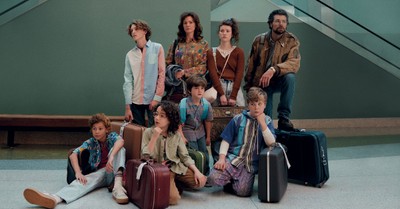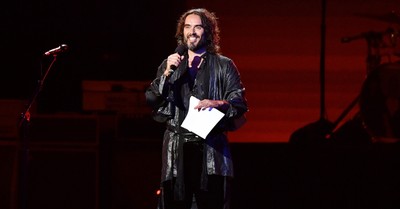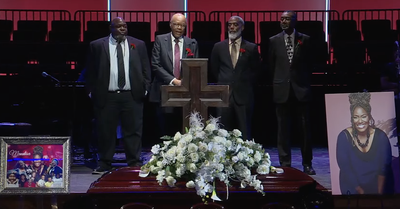We had just stepped out of the mini-van for our first glimpse of Jerusalem's Old City, from the top of Mount Scopus. The Dome of the Rock glistened in the sun; the mystery of ancient buildings beckoned. It was then that Miriam, our tour guide, opened her Bible to Psalm 122. Even she choked back a sob as the words rang true in our hearts. How poignant. How timely.
Peace is a fickle guest within the walls of this beautiful city -- and nation. Violence has escalated at an alarming rate. Suicide bombings now come almost daily. On March 27, up to 20 Israelis were killed by a suicide bomber as they prepared to commemorate Passover.
So who would want to travel to Israel now? That is a question I heard repeatedly in the weeks preceding my March 11-20 visit. Because the trip arose from extraordinary circumstances that could only have been arranged by the Lord, I felt at peace -- in the center of His will -- the safest place to be. One of the lessons He's been emphasizing with me lately is trust: what a perfect classroom.
This was all a bit tough to explain to my family and some friends, of course, but now that I am back, safe and sound, they are willing to listen.
The truth? I honestly had no clue what was happening in other parts of the country until I turned on CNN in my hotel at night. And I was there during three or four "incidents" as well as the visit by Vice President Cheney.
Yes, there were checkpoints on the roads and soldiers in Jerusalem, but after Sept. 11, that didn't seem particularly unusual. Also, experiencing one day of terror in my own nation on Sept. 11 deepened the sense of empathy I felt for a people who live it every day. Seeing Israeli school children accompanied by armed guards at tourist sites was a sad glimpse of reality.
Location, Location
Grasping the geography of Israel is key to understanding why the vast majority of tourists never hear or see the violence. Palestinian and Israeli soldiers generally skirmish in two areas removed from tourists and even most Israeli citizens: the West Bank and Gaza Strip.
Gaza is a narrow strip of land on the Mediterranean Sea, south of Tel Aviv. The West Bank is a series of Palestinian settlements that dot the area of Samaria north of Jerusalem, trailing south to Bethlehem. Most other regions of Israel are peaceful. The Sea of Galilee and Dead Sea areas, my favorites, have not to my knowledge been attacked.
Suicide bombers have targeted parts of Jerusalem and some towns north of Gaza, such as Netanya. But terrorists usually target areas with high concentrations of local Jewish people -- bar mitzvahs, weddings, Passover dinners -- or pizza parlors in the new city.
Tsion Ben-David, director of North American operations for Israel's Ministry of Tourism, told our group that every driver and every guide in Israel are extensively trained to recognize danger; they are frequently updated on potential trouble spots. Indeed. We had to take a very out-of-the-way route in traveling from Galilee to Jerusalem, but none of us minded. I suspect that some of the cell phone calls received by our driver related to safety on the roads, but I felt reassured by that instead of fearful.
"If you follow the direction of your driver and tour guide, you will have a safe and enjoyable experience in the Holy Land," Ben-David emphasized.
Two good points that I found in other sources: "If travelers were in the slightest danger, the media would be reporting it and you would be reading about it," noted HolyLandUpdates. Also, "This war is also a propaganda war and targeting tourists would be bad for the cause," said a Charisma Magazine article.
Perhaps the strongest point was made by Ben-David: "Terrorists don't target tourists or tour buses, because Palestinians rely on tourism too."
"Gentlemen's Agreement"
According to Ben-David, tourism is the number one industry in Palestine. He spoke of a "gentlemen's agreement" regarding tourists, which seems to make sense. (I will explore the impact of the decline in tourism for both Israelis and Palestinians in a future installment.)
"As we see it, tourism is the bridge for peace between nations," Raphael Farber, chairman of Royal Plaza Hotels Israel, said in December 2000. "It should be emphasized that Israeli and Palestinian employees in our hotels work in harmony and they are a symbol of the coexistence between Israelis and Palestinians. Everyone believes that tourism is the leading exporting industry of Israel and of the Palestinian Authority. The crisis in tourism escalates the conflict."
To help address the concerns of travelers, Israel's Ministry of Tourism added a section to its Web site (http://www.goisrael.com) called What the Headlines Mean to You. "We inaugurated this service to meet travelers' need for clear-headed and reliable information, to help them plan their visits to Israel in comfort, safety and security."
Weighing it Out
Libby Pataki, First Lady of the state of New York, said this of her trip to the Holy Land: "Like most people who rely on the nightly news, I had my doubts [before going]. When I returned last month from a week-long mission to Israel, I realized how unfair the media's depictions can be. The Israel I found was far from a place where terrorism is as common as falafel. I never felt threatened. In fact, walking down King George St. in Jerusalem, I felt as safe as I do on Columbus Ave."
Yet on March 27, a report from ICEJ News said Israeli officials with the U.S. Holocaust Memorial Museum and organizers of the March of the Living have canceled upcoming trips to Israel. According to ICEJ, many American Jewish leaders faulted them for calling off the trip, with New York assemblyman Dov Hinkind calling it "an incomprehensible betrayal" that gave a "victory" to PLO chief Yasser Arafat.
Mark Regev, the Israeli Embassy spokesman in Washington, told ICEJ News that the Israeli government is making all possible efforts to provide for the security of visitors. "I would encourage Americans to continue with their travel plans and not to let terrorists dictate the agenda. If terrorists succeed in disrupting our lives, we are letting them win," he added.
Of course no one can guarantee safety, and circumstances evolve almost hourly. Each potential pilgrim needs to prayerfully petition the Lord as to His will in the matter. Each person needs to weigh the risk against the innumerable benefits.
As for me, God touched me so deeply in the Holy Land that any flickers of fear rapidly vanished. This journey marks the second most significant spiritual event in my life thus far. I would not have missed it for anything and plan to one day return.
PHOTOS by Janet Chismar: Top -- Jerusalem, Middle -- Capernaum, Bottom -- Synagogue at Capernaum










